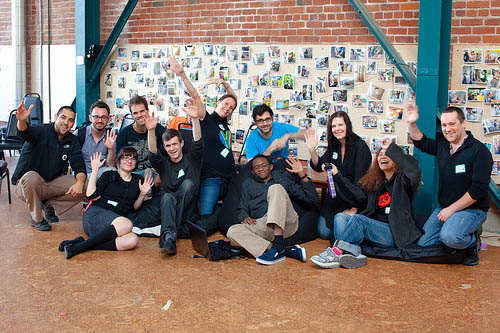Some late-night hacking at Science Hack Day San Francisco. Photo by Matt Biddulph
Dublin is gearing up to be the sixth city in the world to host an international Science Hack Day after London, San Francisco, Mexico City, Cincinnati and Cape Town. Running from 3-4 March, Science Hack Day Dublin will be a free, 36-hour event to give scientists, engineers, programmers and designers the opportunity to brainstorm and find solutions for scientific issues.
Another 24 Science Hack Days are set to run in cities spanning the globe throughout 2012. The first Science Hack Days were held in London and San Francisco in 2010.
Science Hack Day Dublin is being run as part of the Dublin City of Science 2012 programme festival and Engineers Week. It will take place in The Hub at Dublin City University (DCU).
A of volunteers from different creative community groups, such as the Irish Robotics Club, Dublin Hackerspace TOG, Redbrick and The Hub and DCU are collaborating on the event.
The events have been catching on internationally as a way of bridging the gap between the science, technology and design fields.
During the marathon events, a shared physical space will allow scientists to collaborate with programmers, hackers and designers who have the knowledge to find creative solutions – or ‘hacks’ – to better use scientific data, hardware and research tools.
Science Hack Days also aim help to find more efficient ways of utilising open data produced from scientific research and city councils.
As part of its smarter city drive, Dublin City Council, for instance, has been pivotal in that its has opened up all of the city’s data to the public, so groups and researchers can analyse the data.
Lightning talks
So what can people expect at the Science Hack Day in Dublin?
The event will kick off with two rounds of ‘lightening talks’, where scientists, or those with an interesting idea, can pitch project ideas to teams of programmers, hackers, engineers and designers.
Following that, teams will form to work on the projects over the next 36 hours.
The initiative appears to be very similar to the Startup Weekend movement that aims to create new digital start-ups by bringing groups of individuals together to pool their resources and ideas.

Delegates from Mexico, Germany, Brazil, South Africa, Iceland, Canada, United States, Japan, Kenya and Ireland at Science Hack Day in San Francisco. These individuals were able to attend due to a grant from the Alfred P. Sloan Foundation. Photo by Matt Biddulph
Innovative results
Already, Science Hack Days’ collaborative approach to problem solving has produced results in other cities. For instance, the most recent Science Hack Day in San Francisco covered a variety of scientific projects.
Dublin’s Science Hack Day ambassador Dr David McKeown’s team won the Best Government Data Award in San Francisco for a smartphone-based, early-warning notification system for earthquakes.
Other projects used open data resources from the Large Hadron Collider, NASA and PLoS (Public Library of Science). Such projects spanned a range of fields, including cognitive science, marine science and underwater exploration, geophysical smartphone apps, DIY biohacking and data visualisation.
‘Passionate geeks’
Ariel Waldman, founder of San Francisco Science Hack Day, was in Dublin this week for the launch of Science Hack Day Dublin. She spoke about how Dublin already has a “strong community of passionate geeks” that are bridging gaps between science, technology and art.
“Science Hack Day Dublin is the perfect spark to ignite future collaborations and ideas between these communities and anyone who wants to get excited and make things,” she said.
While the Dublin event is free, tickets must be booked in advance.